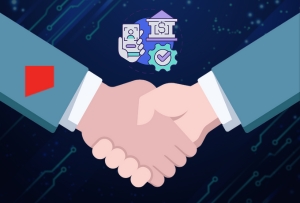What is Banking Software Development?

Experion drives banking into the future with breakthrough software that redefines convenience, security, and customer connection, setting new standards in digital finance. Banking Software Development is the process of creating and maintaining software applications designed to streamline and automate various banking operations. It is where finance meets finesse – a world of software that’s redefining banking, from core platforms that handle every account and loan to smart, specialized tools for retail and digital banking.
As the financial landscape evolves, the demand for digital transformation in the banking sector has become increasingly urgent. Traditional banking methods are being challenged by the rise of fintech companies, changing customer expectations, and the need to adapt to a rapidly evolving technological environment. Banking software development services provide the backbone for this transformation. Let’s see how!
The Role of Software in Modern Banking
Modern banking relies on software to drive both innovation and streamline operations. From simple transactions to complex financial operations, software applications underpin every aspect of the banking industry. Banking software development not only ensures functionality but also keeps banks competitive as they face increasing regulatory, operational, and customer-related demands.
Understanding the Digital Shift
The banking landscape is undergoing a rapid digital transformation. Technological advancements are reshaping the way banks interact with customers, manage operations, and deliver financial services. Factors driving this shift include:
- Rising Customer Expectations: Customers demand seamless, 24/7 access to their finances through digital channels.
- Increased Competition: Fintech companies and digital-only banks are disrupting traditional banking models.
- Regulatory Compliance: Banks must adhere to stringent regulations, which can be efficiently managed through custom banking software development solutions.
- Cybersecurity Threats: Protecting sensitive customer data requires robust security measures implemented through banking software development services.
Key Functions of Banking Software
Banking software plays a crucial role in enabling various essential functions:
- Payment Processing: Facilitating secure and efficient transactions, including real-time payments, card payments, and wire transfers.
- Digital Customer Engagement: Providing user-friendly online and mobile banking platforms, enabling customers to manage their finances conveniently.
- Risk Management: Implementing sophisticated risk assessment and monitoring tools to mitigate financial risks.
- Fraud Detection: Employing advanced analytics to identify and prevent fraudulent activities.
- Regulatory Compliance: Ensuring adherence to regulatory standards through automated compliance checks.
- Data Analytics: Harnessing data to reveal insights into how customers behave, market dynamics, and operational productivity.
Examples of Banking Software
- Core Banking Systems: The foundation of a bank’s operations, handling core functions like account management, loan processing, and deposit management.
- Mobile Banking Apps: Empowering customers to access their accounts, transfer funds, and make payments on the go.
- Online Transaction Platforms: Enabling secure online transactions, including bill payments, fund transfers, and investments.
- Fraud Detection Systems: Leveraging AI and machine learning to detect and prevent fraud.
- Customer Relationship Management (CRM) Systems: Managing customer interactions, preferences, and feedback to enhance customer satisfaction.
Key Features of Banking Software Development

Security and Compliance
- Robust Encryption: Protecting sensitive customer data with advanced encryption techniques.
- Secure Authentication: Implementing strong authentication methods like multi-factor authentication.
- Regular Security Audits: Carrying out frequent security evaluations to uncover and address vulnerabilities.
- Compliance with Regulations: Ensuring adherence to industry standards and regulatory requirements like GDPR, CCPA, and SOX.
Data Management and Analytics
- Centralized Data Storage: Managing and storing vast amounts of data in a secure and efficient manner.
- Data Analytics: Leveraging data to gain valuable insights into customer behavior, market trends, and operational efficiency.
- Real-time Reporting: Generating real-time reports to monitor key performance indicators and make informed decisions.
- Data Privacy: Protecting customer data privacy and complying with data protection regulations.
Automation in Banking
- Workflow Automation: Automating routine tasks to improve efficiency and reduce errors.
- AI-Powered Chatbots: Providing 24/7 customer support through AI-powered chatbots.
- Machine Learning Algorithms: Utilizing machine learning to automate decision-making processes, such as loan approvals and fraud detection.
Integration with Fintech Solutions
- API Integration: Integrating with third-party fintech solutions to enhance banking services.
- Open Banking: Adopting open banking standards to enable seamless data sharing and innovation.
- Payment Gateways: Integrating with various payment gateways to offer diverse payment options.
Types of Banking Software

- Core Banking Systems (CBS)
Core Banking Systems serve as the central hub of all banking activities, essential for maintaining the smooth functioning of a bank. Each component plays a vital role:
- Account Management: CBS allows banks to efficiently create, maintain, and manage various types of customer accounts, such as savings, checking, and fixed deposit accounts. It enables real-time tracking of customer transactions, balance updates, and account modifications while ensuring secure, centralized data storage.
- Loan Management: From application to disbursement and repayment tracking, CBS simplifies the entire loan lifecycle. It manages interest calculations, payment schedules, and customer notifications, streamlining loan handling and reducing the risk of errors in loan records.
- Deposit Management: CBS supports managing diverse deposit products, such as fixed deposits, recurring deposits, and other savings instruments. It helps in calculating interest, handling withdrawals, and tracking maturity dates, offering customers transparency and convenience.
- Payment Processing: This functionality facilitates transactions via cash, checks, electronic transfers, and more. CBS ensures accurate, efficient processing and can integrate with payment networks, allowing banks to meet diverse customer needs.
- Customer Relationship Management (CRM): Banks use integrated CRM modules to maintain customer interactions and preferences. This includes tracking service history, analyzing feedback, and identifying opportunities for cross-selling and upselling services based on customer profiles.
- Reporting and Analytics: CBS generates detailed reports and insights into performance metrics and financial health, allowing banks to assess performance, identify trends, and make data-driven decisions to improve operations and services.
- Mobile Banking Applications
Mobile banking applications enable customers to manage their finances conveniently from their smartphones. Key features include:
- Account Balance Inquiry: Customers can view their account balance and recent transactions in real-time, empowering them to stay informed about their financial status and spending habits.
- Fund Transfers: These apps facilitate easy fund transfers between accounts, whether internal or to external bank accounts, supporting fast, secure financial transactions anytime.
- Bill Payments: Mobile banking apps offer bill payment services for utilities, credit cards, and other recurring expenses, streamlining the payment process and ensuring timely payments.
- Mobile Recharge: Users can recharge mobile and DTH services directly, eliminating the need for third-party apps and providing convenience within a single platform.
- Loan Applications: Customers can apply for loans and track the progress of their applications directly through the app, making loan processing faster and more transparent.
- Customer Support: Access to customer support is available through chatbots, live agents, and frequently asked questions, allowing for seamless issue resolution and guidance on banking services.
- Payment Gateways
Payment gateways are essential for handling secure online payments, bridging the gap between merchants and customers. Their main functions include:
- Secure Payment Processing: Payment gateways use encryption protocols to protect sensitive information like credit card numbers, ensuring data security and reducing the likelihood of fraud.
- Multiple Payment Options: They offer a range of payment options, including credit and debit cards, net banking, and UPI, to cater to diverse customer preferences and improve transaction success rates.
- Real-time Payment Confirmation: These systems instantly verify and confirm transactions, providing immediate feedback to customers and merchants for a smooth purchasing experience.
- Fraud Prevention: By implementing robust fraud detection algorithms, payment gateways monitor transactions for suspicious activity, helping protect against unauthorized transactions and chargebacks.
- Loan Management Software
Loan management software optimizes the entire loan process for banks, reducing manual work and risk. Key features include:
- Loan Origination: The software helps capture loan applications, assesses customer information, and verifies eligibility, ensuring qualified customers progress through the process.
- Credit Scoring: It automates credit assessment by analyzing credit histories and scores, reducing manual efforts and ensuring that loans are approved for creditworthy applicants only.
- Loan Disbursement: Once approved, the loan amount is disbursed to the borrower’s account, and the system records the transaction details for accountability and future reference.
- Loan Servicing: The software manages repayments, interest calculations, and fee collection, providing reminders and account updates to keep both the bank and customer on track.
- Loan Portfolio Management: Banks use this feature to monitor loan performance and detect potential risks in their portfolio, enabling them to take corrective action as needed.
- Risk Management Systems
Risk management systems provide banks with tools to minimize financial risks, ensuring safe operations. These tools cover:
- Credit Risk Management: This module assesses a borrower’s creditworthiness, helping banks make informed lending decisions and control exposure to credit risk.
- Market Risk Management: By analyzing market trends and fluctuations, banks can gauge the impact on their portfolio and adjust strategies to protect assets against market volatility.
- Operational Risk Management: The system identifies risks such as system downtimes, human error, and procedural flaws, ensuring banks have protocols to prevent operational disruptions.
- Regulatory Risk Management: It assists banks in complying with financial regulations, reducing the risk of non-compliance penalties and helping maintain regulatory integrity.
- Fraud Risk Management: Risk management systems monitor transactions for red flags and anomalies, enabling timely action to prevent financial losses and protect customer trust.
Benefits of Banking Software Development
Here’s a breakdown of the benefits of banking software development across key areas:
Enhanced Customer Experience
Banking software development focuses on meeting customer demands for convenience, personalization, and real-time information. The primary benefits include:
- 24/7 Accessibility: By providing round-the-clock access, customers can manage accounts, transfer funds, and conduct other banking transactions anytime, from anywhere, boosting customer satisfaction and loyalty.
- Personalized Services: Leveraging data analytics, banks can offer tailored financial products, customized investment options, and targeted loan offers, creating a more relevant and valuable experience for each customer.
- Seamless Digital Experience: Well-designed, intuitive user interfaces enhance customer interactions, making it easy to navigate services like checking balances, transferring funds, and paying bills without any frustration.
- Real-time Insights: Real-time account access provides immediate updates on account balances and recent transactions, giving customers confidence in managing their finances with transparency and control.
Operational Efficiency
With banking software development, banks can streamline operations, minimize errors, and enhance productivity, resulting in numerous efficiencies:
- Automation of Processes: Routine banking tasks, like payment processing, data entry, and report generation, are automated, allowing employees to focus on high-value activities while reducing the risk of human error.
- Improved Decision-Making: Data-driven insights generated through banking software development services help banks analyze trends, understand customer behavior, and make informed decisions on products, pricing, and risk management.
- Faster Time-to-Market: With streamlined development cycles, banks can quickly roll out new products or update existing services, staying competitive in an ever-evolving market and responding to customer needs promptly.
- Reduced Operational Costs: By digitizing processes, banks minimize paper-based operations and reduce redundancies, leading to significant savings on administrative and operational costs.
Cost Savings
Banking software development supports cost reduction while enabling revenue growth through innovative services and efficient operations:
- Reduced Overhead Costs: Digital banking lowers the need for physical infrastructure and staffing, reducing branch-based expenditures and administrative costs, especially with self-service solutions.
- Increased Revenue Opportunities: The flexibility to launch new, innovative services—like mobile payment solutions or targeted lending programs—opens avenues for increased revenue streams.
- Improved Risk Management: Advanced risk management tools within banking software development help banks proactively identify and mitigate financial risks, reducing potential losses from fraud, credit risk, or regulatory penalties.
Scalability
Scalability allows banks to grow smoothly without compromising performance, meeting increasing demands in an efficient way:
- Flexible Solutions: Banking software development solutions are adaptable to changing needs, allowing banks to customize features and functionality as their customer base grows or regulatory requirements shift.
- Scalable Infrastructure: Modern software infrastructure can handle greater workloads as the bank grows, accommodating more users, transactions, and data without needing a full system overhaul.
- Future-Proof Technology: By integrating cutting-edge technologies like AI, blockchain, and cloud computing, banking software development enables banks to keep pace with industry advancements and be ready for future demands.
As your trusted partner in innovation, Experion leverages data-driven insights and cutting-edge technology to create banking solutions that go beyond functionality—they transform.
Challenges in Banking Software Development
Banking Software Development comes with several challenges, impacting everything from security to customer expectations. Here’s a detailed look at each:
Regulatory and Compliance Hurdles
Banks operate in a highly regulated environment, and compliance with these regulations is essential but complex:
- Evolving Regulations: The financial sector is constantly adapting to new regulations, which can vary by region and market conditions. Keeping software updated to remain compliant with these frequent changes requires a flexible and responsive development process.
- Strict Compliance Standards: Regulations like GDPR, CCPA, and SOX impose stringent data privacy, security, and transparency standards. Ensuring compliance demands robust encryption, access control, and regular audits to prevent breaches and unauthorized access.
Data Security and Cybersecurity
Security is paramount in banking software development, given the high stakes of protecting financial data:
- Cyber Threats: Banks face constant cyber threats, such as phishing, ransomware, and DDoS attacks. Protecting software against these threats requires a proactive, multi-layered approach to security.
- Data Breaches: Breaches can lead to significant financial and reputational damage, making data breach prevention a critical priority. Regular security testing, employee training, and incident response protocols are essential to mitigate these risks.
- Protecting Sensitive Data: Banking software must be designed to protect personal and financial information with advanced encryption, secure authentication, and strict data handling procedures to meet customer and regulatory expectations.
Legacy Systems Integration
Many banks continue to rely on legacy systems, which pose obstacles in modernizing operations and implementing new solutions:
- Outdated Technology: Legacy systems may lack the flexibility, speed, and security needed for modern banking demands. These outdated systems are costly to maintain and are often incompatible with newer technologies, limiting banks’ ability to innovate.
- Integration Challenges: Integrating modern software with legacy systems is complex, requiring expertise in both old and new technologies. This process can be time-consuming and may disrupt regular banking services if not managed carefully.
- Data Migration: Moving data from legacy systems to new platforms without data loss is a significant challenge. This process requires careful planning and verification to ensure data integrity and minimize downtime.
Customer Expectations
Modern customers expect a high-quality digital banking experience that is fast, secure, and personalized:
- Digital-First Approach: Today’s customers want convenient, digital access to banking services across all channels, from mobile apps to web portals. Delivering a seamless, unified experience requires strong UX design and technology that integrates well across platforms.
- Real-time Services: Customers expect real-time access to account information and transaction updates. Implementing these real-time capabilities requires robust backend systems and a reliable infrastructure.
- Personalized Banking: To meet customer demand for personalized financial products, banks need advanced data analytics and AI. This personalization, however, must be balanced with security, as more data is analyzed to offer these tailored services.
- High Security Standards: Customers expect their personal and financial data to be well-protected. Banks need to uphold high security standards while providing a seamless user experience, which can be challenging to balance.
Key Trends Driving the Future of Banking Software Development
 Banking software development is rapidly evolving, with several key trends influencing the direction of new innovations. Here’s a closer look at the trends shaping the future.
Banking software development is rapidly evolving, with several key trends influencing the direction of new innovations. Here’s a closer look at the trends shaping the future.
Artificial Intelligence (AI) and Machine Learning (ML)
AI and ML are transforming banking by enabling smarter, faster, and more secure processes:
- Enhanced Fraud Detection: Advanced algorithms detect suspicious patterns and alert banks to potential fraud, significantly improving the bank’s ability to prevent security breaches.
- Improved Customer Service: AI-driven chatbots provide instant, full-time customer support, efficiently addressing common questions and resolving issues, which reduces wait times and boosts satisfaction.
- Personalized Banking: AI can analyze transaction data, spending habits, and personal preferences, allowing banks to offer customized financial products and services that meet individual customer needs.
Blockchain and Cryptocurrencies
Blockchain technology provides transparency, security, and efficiency in banking transactions:
- Secure Transactions: Blockchain’s decentralized ledger ensures that all transactions are immutable and transparent, improving trust and reducing the risk of fraud.
- Decentralized Banking: Blockchain enables peer-to-peer transactions, reducing reliance on intermediaries and lowering transaction costs.
- Smart Contracts: These self-executing contracts automate processes, reducing paperwork, cutting operational costs, and enhancing efficiency in areas like loan approvals and settlements.
Cloud Banking
Cloud-based solutions are revolutionizing the flexibility and scalability of banking services:
- Scalability: Cloud infrastructure allows banks to easily scale resources up or down based on demand, ensuring seamless operations without requiring costly on-premise hardware.
- Cost-Effectiveness: Cloud services follow a pay-as-you-go model, minimizing initial infrastructure investment and enabling banks to allocate resources more efficiently.
- Improved Disaster Recovery: Cloud solutions often include robust data security, backups, and disaster recovery capabilities, ensuring business continuity in the event of a system failure.
Open Banking and APIs
Open banking initiatives encourage innovation and expand customer access to diverse financial services:
- Innovation: By exposing their APIs, banks enable third-party developers to build innovative applications that integrate with bank services, fostering a collaborative financial ecosystem.
- Enhanced Customer Experience: Open banking provides customers with a broader selection of services, from investment advice to budgeting tools, enriching the customer experience.
- Data-Driven Insights: Banks can leverage data shared through APIs to gain insights into customer needs, enabling informed decision-making and tailored product development.
Selecting the Right Partner for Banking Software Development
Selecting the right software development partner is crucial for the success of banking software. Here’s what to look for:
Experience in the Financial Industry
Partnering with a firm that understands the complexities of the financial sector is vital.
- Domain Expertise: Choose a partner experienced in banking regulations and industry standards. This expertise ensures they skillfully navigate compliance and build software solutions that meet essential standards.
- Proven Track Record: Evaluate their portfolio to ensure they have successfully delivered banking software projects with measurable results. Testimonials, case studies, and client reviews offer insight into their capabilities.
Security-First Approach
Given the sensitivity of banking data, prioritizing security is essential.
- Robust Security Measures: Ensure your software partner enforces strong security protocols, such as encryption, access control, and regular security audits. These practices are essential to safeguard against data breaches and cyber threats, ensuring your system is protected and remains resilient in today’s digital landscape.
- Compliance with Regulations: Your software partner needs in-depth knowledge of key regulations, like GDPR, CCPA, and SOX, ensuring compliance from the start. This understanding helps build secure, regulatory-aligned solutions that protect data and uphold customer trust, making it easier for your organization to meet industry standards confidently.
Customization and Flexibility
A flexible partner who can tailor software to unique business needs ensures that the solution fits your specific operational requirements.
- Tailored Solutions: Look for a partner capable of creating customized features aligned with your bank’s services and operational processes.
- Adaptability: As banking technology continues to evolve, ensure the partner can incorporate new technologies and respond to changing business needs, keeping the software future-proof.
Ongoing Support and Maintenance
Reliable support and consistent maintenance are critical to ensure the long-term success and security of banking software.
- Reliable Support: A dedicated support team should be available to handle any issues, ensuring minimal disruption to banking services.
- Regular Updates and Maintenance: Choose a partner that provides regular software updates, keeping the system secure and aligned with the latest industry standards.
How Experion Can Help You in Banking Software Development
 At Experion, we’re dedicated to empowering banks with advanced digital solutions that ensure efficiency, security, and regulatory compliance. Here’s how our expertise stands out:
At Experion, we’re dedicated to empowering banks with advanced digital solutions that ensure efficiency, security, and regulatory compliance. Here’s how our expertise stands out:
- Custom Platform Engineering: We design and develop platforms tailored to banking needs, from loan automation to wealth management tools.
- Data-Driven Insights: Our analytics capabilities support fraud prevention, customer insights, and optimized decision-making.
- Seamless Integration: We integrate modern solutions with legacy systems, ensuring a smooth digital transition.
- Enhanced Cybersecurity: We prioritize data protection and regulatory alignment.
- End-to-End Support: From development to maintenance, our team ensures consistent, secure performance.
Key Takeaways
- Banking software development automates core operations like account management and loan processing, improving efficiency and service quality.
- Software enables banks to offer 24/7 personalized digital experiences, meeting modern customer expectations.
- Automating routine tasks through software reduces errors, accelerates workflows, and frees resources for high-value services.
- Security measures like encryption and multi-factor authentication protect customer data and mitigate cyber risks.
- Compliance features within banking software help banks meet regulations like GDPR and SOX, avoiding potential penalties.
- Core banking systems support essential functions such as account and loan management, deposits, and reporting.
- Mobile banking apps and secure payment gateways provide convenient, secure access to financial services on the go.
- AI-powered tools, including chatbots and fraud detection, enhance customer support, risk management, and operational efficiency.
- Emerging technologies like AI, blockchain, and open banking will continue driving innovation in banking services.
- Selecting a development partner with financial expertise, strong security, and ongoing support is key to successful software implementation.
Join Experion on a path toward innovation, where every software solution is a stepping stone toward a more connected, efficient, and secure banking landscape!

